News
Roosterfish crows, ready to reel ’em in again


The legendary Venice gay dive bar is set to return in December. (Photo Wikipedia)
Like Cher’s Farewell Tour, a goodbye doesn’t always mean goodbye…forever.
Roosterfish, the iconic Abbot Kinney dive bar that closed in May, is set to reopen to the delight of everyone who thinks Venice is in danger of being whitewashed and becoming polluted by cold-pressed juice bars and luxury retail stores.
Originally opened in 1979, Roosterfish was the anti-Weho gay bar for the Westside and was as famous for its cheap drinks as it was for its eggshell blue exterior walls. New owners Mario Vollera and Patrick Brunet, who also operate South End, a wine bar and pizzeria on Abbot Kinney, plan to keep the original exterior and pornographic images that wallpaper the men’s bathroom ceiling, but plan to give the bar more standing room and natural light, and yes, increase the drink prices.
Venice Beach Pride will be funded in a licensing agreement with the Roosterfish building leaseholders who pay an annual fee to use the trademarked name and brand. Photo by Grant Turck
Founder and president of Venice Pride Grant Turck has been key to the bar’s resurrection. Turck founded Venice Pride as a result of the bar’s closing, wanting to protect the cultural identity of Venice. He has since been steadfast in his efforts to preserve the bar – first in an unsuccessful attempt at having it designated a historic landmark, and then by protecting the Roosterfish name by trademarking it, something the original owners had not done.
After learning Vollera and Brunet had leased the space, he approached the duo and convinced them to license the name and reopen Roosterfish instead of opening a new concept.
Roosterfish Bar Venice Beach California from Rolf Johnson on Vimeo.
“Roosterfish is more than a bar, it is an important community center where the LGBTQ community can gather and feel safe,” Turck told The Los Angeles Blade. “As part of a unique arrangement, the new leaseholders will be paying Venice Pride an annual licensing fee of $40,000 for the use of the Roosterfish trademark. These funds will fund Venice Pride’s June celebration for the next decade and ensure it remains free and open to the public.”

500 people turned out September 23 for Roosterfish’s return party. (Photos provided by Roosterfish organizers)
On September 23, the bar reopened for a single night to host Roosterfish Revived, an inclusive community celebration and fundraiser benefitting Venice Pride that raised $13,200 from the one-day event. More than 500 people turned out for the event including officials from Councilmember Bonin’s Office, Mayor Eric Garcetti’s Office and Supervisor Kuehl’s Office.
“From Sonia who walked into Roosterfish for the first time back in 1991 and drove down from Northern California just to attend the one-day event to Dustin Lance Black who had his first drink at the bar in 1995 after turning 21, Roosterfish had a big impact on people from all walks of life,” Turck said.
The new owners want to maintain the flavor of the original bar and protect its role in the Venice community.
“We love Venice. We love Abbot Kinney. Roosterfish is such an historical landmark that we wanted to make sure it won’t become another retail store,” Vollera and Brunet told La Weekly via email. “Venice’s identity was forged from the melting pot of nationalities, cultures and ambitions. Reopening Roosterfish is a cultural act.”
“There’s no gay bar west of the 405 in Los Angeles. I’m mincing words a little bit there, because you have the Birdcage west of the 405, but that’s technically Santa Monica,” Turck said to LA Weekly. “There’s a real need for a gay bar again on the Westside, and there’s no better place for it to be than the place that was always there. I think the vision is that the Roosterfish 2.0 will be a place that’s welcoming to the LGBTQ community and its allies.”
The Roosterfish is set to reopen December 2017.

Politics
Smithsonian staff concerned about future of LGBTQ programming
Secretary Lonnie G. Bunch III appeared before a hearing led by Republicans flagging concerns re: “the Left’s indoctrination of our children”
WASHINGTON — Staff at the Smithsonian Institution are concerned about the future of LGBTQ programming as several events featuring a drag performer were cancelled or postponed following scrutiny by House Republicans, according to emails reviewed by the Washington Post.
In December, Secretary Lonnie G. Bunch III appeared before a hearing led by GOP members of the Committee on House Administration, who flagged concerns about the Smithsonian’s involvement in “the Left’s indoctrination of our children.”
Under questioning from U.S. Rep. Stephanie Bice (R-Okla.), Bunch said he was “surprised” to learn the Smithsonian had hosted six drag events over the past three years, telling the lawmakers “It’s not appropriate to expose children” to these performances.
Collaborations with drag artist Pattie Gonia in December, January, and March were subsequently postponed or cancelled, the Post reported on Saturday, adding that a Smithsonian spokesperson blamed “budgetary constraints and other resource issues” and the museums are still developing programming for Pride month in June.
“I, along with all senior leaders, take seriously the concerns expressed by staff and will continue to do so,” Bunch said in a statement to the paper. “As we have reiterated, LGBTQ+ content is welcome at the Smithsonian.”
The secretary sent an email on Friday expressing plans to meet with leaders of the Smithsonian Pride Alliance, one of the two groups that detailed their concerns to him following December’s hearing.
Bunch told the Pride Alliance in January that with his response to Bice’s question, his intention was to “immediately stress that the Smithsonian does not expose children to inappropriate content.”

“A hearing setting does not give you ample time to expand,” he said, adding that with more time he would have spoken “more broadly about the merits and goals of our programming and content development and how we equip parents to make choices about what content their children experience.”
Florida
Gov. DeSantis denounces ‘weaponization’ of book challenges
‘They’re going to be holding many teachers accountable,’ he said signing a bill restricting nonparents to 1 book challenge per month

By Michael Moline | TALLAHASSEE, Fla. – The DeSantis administration plans to punish teachers and principals deemed to be exploiting public school book challenges to, in the governor’s view, “weaponize” Florida’s parental rights laws.
DeSantis leveled that charge Monday during a news conference in Pensacola. On Tuesday, he raised it again during a second news conference in Jacksonville, where he signed legislation restricting nonparents to one book challenge per month.
The challenges come under state law allowing anyone to complain about the content of classroom materials they deem objectionable or pornographic. The laws require removal of challenged books pending reviews that can take considerable time. DeSantis began trying to tone down the situation in February, in advance of the 2024 legislative session.

“Manny, in the Department of Education, they’re going to be holding many principals or teachers accountable who are weaponizing this,” DeSantis said Tuesday, referring to Education Commissioner Manny Diaz Jr.
DeSantis cited Sarasota County teachers who “papered over every book in the classroom, saying, ‘Oh! You can’t have books! The state’s not letting me show you books! That’s a lie. That’s not true. That’s performative.
“And so, that’s somebody who’s entrusted to teach kids putting their political agenda over the best interests of the students’ education and their access to learning. That’s wrong; that’s not going to stand in the state of Florida. So, we don’t have time for your activism; we don’t have time for your nonsense. We have a process in place to empower parents,” the governor said.
Teachers told the Sarasota Herald Tribune in January 2023 that they feared prosecution if they put students in contact with unvetted books.
The Phoenix asked the administration for an explanation of any investigations launched or punishment inflicted on school employees but hasn’t heard back yet.
Rebuttal
Florida Education Association President Andrew Spar issued a rebuttal in the form of a written statement.
“It’s important to remember that Gov. DeSantis’ full throated support is the reason why fringe groups who do not represent the majority of Floridians and often do not have students in the classroom have felt so comfortable removing books off shelves and making Florida the leader in the nation on book banning,” Spar said.
“This rule does nothing to fix the vague language that caused the issue in the first place, no matter how much the Governor and Commissioner Manny Diaz try to shift blame. Schools, teachers, and media specialists have long been asking for guidance on this issue and once again, instead of providing students what they need, Florida’s elected and appointed officials decide to play the blame game instead of taking responsibility,” Spar continued.
The American Library Association has reported that the bulk of the book challenges nationally come from conservatives.
“Recent censorship data are evidence of a growing, well-organized, conservative political movement, the goals of which include removing books about race, history, gender identity, sexuality, and reproductive health from America’s public and school libraries that do not meet their approval,” the association says in a written statement on its website.
“Using social media and other channels, these groups distribute book lists to their local chapters and individual adherents, who then utilize the lists to initiate a mass challenge that can empty the shelves of a library,” the association continues.
Florida saw 2,672 titles challenged during 2023, it says.
Meanwhile, PEN America recorded 1,406 book ban cases in Florida during the 2022-2023 school year, which accounted for 40% of the national total.
One challenge per customer
The new law (HB 1285) restricts challenges by people without children in a school district to one per month, while parents and guardians remain free to issue unlimited challenges.
That would still allow 12 challenges by nonparents per year, Diaz observed during Tuesday’s news conference. However, “Anyone who creates a cottage industry of going around the state and just creating challenges just to gunk up the system and put schools in arrears as far as reviewing these books, that person won’t be able to do it anymore,” Diaz said.
DeSantis complained that the news media have inflated challenges against classic books and biographies of important Americans while playing down other materials, including LGBTQ content, that he considers unsuitable for young kids or even pornographic.
“They’ve said, ‘Oh, you know, you’re not having Rosa Parks’ — and yet that’s on the summer reading list. Things about Hank Aaron, a book of the month from the Department of Education. So that’s clearly a bad-faith challenge, just trying to create a narrative,” DeSantis said.
“Some of those bad-faith actions have been done from people within the school system who are doing that to try to create a narrative. So, Manny will be able to hold those folks accountable because clearly there’s nothing in Florida law that would tell you to do that,” he continued.
Spar observed: “What Gov. DeSantis and Commissioner Manny Diaz always seem to forget when they attack public schools is that they have failed public schools through their punitive policies that have worsened the teacher and staff shortage and kept teacher and staff pay low. It is clear their political agenda is more important than the needs of Florida’s students.”
**************************************************************************************

Michael Moline has covered politics and the legal system for more than 30 years. He is a former managing editor of the San Francisco Daily Journal and former assistant managing editor of The National Law Journal.
**************************************************************************************
The preceding article was previously published by the Florida Phoenix and is republished with permission.
The Phoenix is a nonprofit news site that’s free of advertising and free to readers. We cover state government and politics with a staff of five journalists located at the Florida Press Center in downtown Tallahassee.
We’re part of States Newsroom, the nation’s largest state-focused nonprofit news organization.
Louisiana
Louisiana’s Superintendent of Education decries new Title IX rules
“The Title IX rule changes recklessly endanger students and seek to dismantle equal opportunities for females”

BATON ROUGE, La. – In a letter sent out Monday to all Louisiana school districts, state Superintendent of Education Cade Brumley warned that administrators should not comply with new federal rules that extend civil rights protections to LGBTQ+ students.
The Biden-Harris administration’s revised final rule of Title IX policy protects LGBTQ+ students from discrimination and other abuse was issued by the U.S. Department of Education last Friday.
While the new rule does not provide guidance on whether schools must allow transgender students to play on sports teams corresponding with their gender identity to comply with Title IX, the question is addressed in a separate rule proposed by the agency in April.
In his letter, reported by NOLA.com/The Advocate, Brumley said the federal rules, which take effect Aug. 1, would force schools to allow transgender girls to use girls’ restrooms and locker rooms. He also said the rules would compel teachers to call students by their preferred names and pronouns — a requirement that would appear to conflict with a bill in the Louisiana Legislature to protect teachers who refuse to refer to students by pronouns that don’t match their sex assigned at birth.
Brumley said he believes the rules would also conflict would a 2022 state law that bans transgender girls and women from participating on female sports teams at the K-12 school or college level, NOLA.com/The Advocate reported.
“The Title IX rule changes recklessly endanger students and seek to dismantle equal opportunities for females,” he wrote in the April 22 letter.
Restating his “staunch opposition” to the federal rules, Brumley said “it remains my position that schools should not alter policies or procedures at this time.”
Jennifer Klein, the director of the White House Gender Policy Council, said during a call with reporters Thursday that the administration sought to strike a balance with respect to these issues, “reaffirming our longstanding commitment to fundamental fairness.”
Political commentary & analysis
20 bills die as Iowa Legislature adjourns-attacks on LGBTQ+ fail
Iowa becomes the latest state to adjourn Sine Die without passing a single piece of explicitly anti-LGBTQ+ legislation
By Erin Reed – DES MOINES, Iowa – In the latest in a series of victories for trans and queer people in statehouses across the United States, Iowa’s legislature has adjourned sine die without passing a single piece of explicitly anti-LGBTQ+ legislation.
This is despite more than 20 bills being introduced targeting LGBTQ+ individuals, including some introduced and prioritized by the governor herself.
Other states, which have historically shown a willingness to pass LGBTQ+ legislation, have also failed in efforts to pass such legislation this year, including Florida, Georgia, and West Virginia. This is leaving some to wonder if anti-trans and anti-queer politics are beginning to run into resistance, at least in the lead-up to the 2024 election fight.
This year, Iowa was at the center of numerous debates over anti-LGBTQ+ legislation, particularly targeting transgender individuals. One bill aimed to remove transgender people from the state’s civil rights code and declare them “disabled.”
Another proposal, known as the “pink triangle bill,” would have required special gender markers on the birth certificates and driver’s licenses of transgender people. One bill would have redefined “equal” to no longer mean “same” or “identical” for transgender people.
A further measure sought to ban transgender individuals from restrooms that match their gender identity. Nonetheless, all of these bills failed to pass as the legislature reached its closing hours.
This is not due to a lack of effort by a handful of Republican legislators who saw this as their priority issue. In the final moments of the session, sensing defeat, Republicans attempted to pass an anti-transgender birth certificate bill by introducing an amendment to ban such certificates onto a bill supporting the loved ones of fallen veterans.
Perhaps realizing that such a move would likely be seen as politically unpopular, they withdrew the amendment before the legislature adjourned.
Over 20 bills targeting the LGBTQ+ community that were introduced this year died. Counting rollover bills from the previous year, Iowa Safe Schools states that number is as high as 39 bills that have been defeated.
The only bills to pass was a broad “religious freedom restoration act,” which could allow broad discrimination against LGBTQ+ people and many other classes of people using religion as a shield, as well as a DEI ban. Though both bills have negative impacts on LGBTQ+ people, neither bill contained the targeted provisions seen in several others that were introduced this year.
Iowa has been the site of fierce resistance to anti-LGBTQ+ legislation this year. For one piece of legislation removing transgender people from the state civil rights code, over 300 people lined up in the hallway to speak out against the bill. When the bill was defeated in committee, cheers could be heard throughout the hallway.
Responding to that bills defeat at the time, Damian Thompson of Iowa Safe Schools stated, “From what I can tell, opposition was overwhelming, before the hearing, during the hearing, and after the hearing.” He later added, “This is the kind of response we need to see with every anti-LGBTQ legislation. We need the entire community united in opposition. What they are trying to do, we’ve seen it, they are trying to divide us. The LGB against the T, and it’s not going to work.”
Iowa is not the only state to witness significant victories over anti-LGBTQ+ and anti-trans legislation this year. Earlier, all explicitly anti-LGBTQ+ bills—20 in total—were defeated in Florida, prompting a statement from local HRC advocates that “The tide is turning.”
Similarly, over 20 bills failed in West Virginia, leading to celebrations. In Georgia, every anti-LGBTQ+ bill also failed, despite similar last-minute attempts to amend anti-LGBTQ+ legislation into entirely unrelated bills.
Although attacks on trans and queer individuals have encountered significant obstacles in Iowa and other states historically targeting LGBTQ+ people, some states are advancing with particularly severe legislation.
These states include Tennessee, Alabama, Mississippi, and Louisiana, all of which have introduced bills that would ban transgender people from bathrooms, allow individuals with religious objections to adopt LGBTQ+ children, and more.
Meanwhile, Ohio is moving forward with a bathroom ban that could affect transgender adults in colleges, and Utah has already passed a sweeping bathroom and locker room ban this year. Additionally, the United States presidential election is already witnessing political attacks on transgender individuals, which may intensify in the coming months.
For transgender Iowans, however, any further attacks will have to wait until the outcomes of the 2024 election cycle are clear. Early indications from Iowa suggest that such attacks may not be politically popular in the state.
For example, Moms For Liberty candidates were defeated in 12 of 13 highly contested school board elections in the state in 2023. Additionally, Pella, Iowa—a town that favored Trump by over 35 points—defeated a local book ban.
If similar election results occur in 2024, then attacks on LGBTQ+ individuals may continue to falter in the state, giving its trans and queer residents a moment to breathe as they begin the long battle to roll back harsh laws targeting LGBTQ+ people enacted in recent years.
****************************************************************************

Erin Reed is a transgender woman (she/her pronouns) and researcher who tracks anti-LGBTQ+ legislation around the world and helps people become better advocates for their queer family, friends, colleagues, and community. Reed also is a social media consultant and public speaker.
******************************************************************************************
The preceding article was first published at Erin In The Morning and is republished with permission.
Africa
Ugandan Census will not count intersex people
Advocacy group report documents rampant discrimination, marginalization

KAMPALA, Uganda — Uganda’s national Census next month will not count intersex people.
The revelation about the exclusion of intersex Ugandans in the 9-day Census exercise that will begin on May 10 has been confirmed to the Washington Blade by the head of Uganda’s Bureau of Statistics.
UBOS Executive Director Chris Mukiza in response to the Blade’s questions on the issue said the agency has “no business with intersex.”
Their counting could have made Uganda the second African country and the third globally after Australia and Kenya to collect an intersex person’s data in a Census.
Kenya’s 2019 Census determined there were more than 1,500 intersex people in the country.
Uganda had a population of 34.8 million, according to the country’s last Census that took place in 2014.
Intersex people in Uganda are among marginalized groups, subject to stigma and discrimination. The government has yet to recognize them as the third sex and consider them among other minority groups, such as people with disabilities, who enjoy special treatment.
Intersex people cannot be exclusively categorized as male or female for having a biological congenital condition with unique sex characteristics due to inherent and mixed anatomical, hormonal, gonadal, or chromosomal patterns that could be apparent before, at birth, in childhood, puberty, or adulthood.
Mukiza’s position of excluding intersex people in the Census, however, comes amid the prime minister’s office’s demands for inclusivity and equality for all the population. (The Constitutional Court on April 3 refused to “nullify the Anti-Homosexuality Act in its totality.”)
“We recognize that much work remains to be done particularly in addressing the needs of the marginalized and vulnerable communities, promoting inclusive economic growth, and combating climate change,” said Dunstan Balaba, the permanent secretary in the prime minister’s office.
Balaba spoke on April 18 during the National Population and Housing Census prayer breakfast meeting the UBOS convened. Religious leaders and other stakeholders attended it.
President Yoweri Museveni has noted that data from the country’s sixth national Census will be crucial towards achieving the nation’s Vision 2040 and help the government, non-governmental organizations, and donors in providing services to the diverse population.
“It will also provide the basis for planning the provision of social services such as education, health, and transport, among others at the national and local level,” Museveni said as he urged citizens to fully support the Census and provide accurate information.
Uganda has an intersex rights organization, “Support Initiative for People with Atypical Sex Development (SIPD),” which activist Julius Kaggwa founded in 2008 with the support of groups that advocate for children, women, and other marginalized populations.
Some of SIPD’s work as a non-profit, grassroots organization includes community outreach and engagement, sharing reliable information with the society for the protection of intersex people’s rights, and championing the need for organized medical and psychological support.
The organization, through its numerous reports, has decried human rights violations against intersex people that include surgery without consent, discrimination in homes, schools and medical centers, parents abandoning intersex children, and stigma due to lack of legal protection by the government.
Uganda’s Registration of Births and Deaths Act allows a parent or guardian of a child under the age of 21 to change the name or sex at the local registration office. The SIPD, however, maintains this law is discriminatory to intersex people over 21 who want to change their sex characteristics, and want parliament to repeal it.
The intersex rights organization wants the Health Ministry to establish a central registry to register intersex children after they’re born in order to receive support in terms of healthcare, social and legal by the government and other stakeholders as they grow up.
SIPD particularly wants the government to enact a policy that would allow a gender-neutral marker on birth certificates for intersex children to ease any change of sex in the future. The organization also wants the government, through the Education Ministry, to adopt a curriculum that also considers intersex issues in schools and creates a friendly environment for intersex children to learn and graduate like their non-intersex peers.
These demands follow SIPD’s findings that disclosed many intersex children were dropping out of school because of the stigma and discrimination they suffered. The organization has further called on the public-funded Uganda Human Rights Commission to live up to its constitutional mandates of defending human rights by leading the promotion and protection of the rights of intersex people across the country.
SIPD has also challenged religious leaders, who play a key role in Ugandan society and are influential at the local and national level, to promote acceptance of intersex people and to end discrimination against them.
World
Out in the World: LGBTQ+ news from Europe & Asia
LGBTQ+ news stories from around the globe including Iraq, United Kingdom, Sweden, Czech Republic, Nepal & New Zealand

IRAQ

BAGHDAD, Iraq – A law is being discussed in the Iraqi parliament that would introduce the death penalty or life in prison for same-sex relations Reuters reported this week. Western diplomats have warned Iraqi lawmakers that if passed the law could have serious consequences for Iraq’s political and economic ties.
According to Reuters the measure imposes a sentence of life imprisonment or the death penalty for anyone engaging in same-sex relations or anyone who swaps their wife with someone else’s for sexual purposes. Lawmakers postponed voting over time constraints and that some disagreements remained over proposed amendments
The law contains a provision that echoes the Russian law banning the promotion of homosexuality and violations are punishable by at least seven years in prison.
UNITED KINGDOM

(Screenshot/Parliament TV)
LONDON, UK – Miriam Cates, the Tory MP for Penistone and Stocksbridge in South Yorkshire, took aim this week against a proposal to set up voluntary “gender and sexual orientation alliance groups” in Scottish schools that opt in.
Speaking to GB News, Cates said: “These are children who have not been through puberty and they don’t have sexual feelings. Asking them if they are straight or gay is not only ridiculous, it is also disturbing. Why would an adult in a school be asking a small child about their sexual feelings?” She added that the scheme is “very, very worrying” and has been “dressed up to be seen as a diversity agenda, an inclusivity agenda.”
The Tory MP has a long record of anti-LGBTQ+ remarks and activism. In January 2023, after the government of Prime Minister Rishi Sunak announced its unprecedented decision to use a Section 35 order under the Scotland Act to prevent the Scottish bill from becoming law, addressing Commons, Cates said she believed it was “absolutely right” for the Tory government to block Scotland’s gender reform law.
PinkNewsUK reported Cates then claimed the bill would make it “vastly easier for a predator to gain access to children” and alleged it would have a “chilling effect” on single-sex spaces.
PinkNewsUK also noted that the Tory MP said that this latest push to encourage schools to install gender-neutral toilets, and hold meetings about LGBTQ+ inclusion, among other initiatives in Scotland was little more than “adults with a particular ideology are pushing that ideology on children, with damaging effects.”
A Scottish government spokesperson told The Telegraph: “We are committed to doing everything we can to make Scotland the best place to grow up for LGBTQI+ young people.” The spokesperson added: “This includes funding LGBT Youth Scotland to deliver a range of projects, such as the LGBT Charter program.”
SWEDEN

(Photo Credit: Konungariket Sveriges regering/Government of the Kingdom of Sweden)
STOCKHOLM, Sweden – The Swedish parliament has passed a sweeping gender-recognition law that eases the process for trans people to update their legal gender. The law also lowers the minimum age for a gender change from 18 to 16, although minors will be required to have the consent of their parents, a doctor, and the National Board of Welfare.
The Swedish Parliament adopted the law in a 234-94 vote Wednesday, April 17, following six hours of tense debate. The law will come into effect next July.
The law was supported by the Moderate Party, which is the largest party in the governing coalition, as well as several opposition parties. The bill was vehemently opposed by the Christian Democrats, which are part of the coalition, and the far-right Sweden Democrats, who are in allied with but not a part of the government.
Sweden became the first modern country to allow legal gender change back in 1972, but the process to do so was derided as cumbersome and dehumanizing. Trans people would be forced to live in their gender identity for at least two years before applying, they’d have to be single or divorce their spouse, and they’d have to first undergo sex reassignment surgery and sterilization.
Roughly 800 trans Swedes are believed to have undergone sterilization under this regime before the law was changed to remove that requirement in 2013. In 2018, parliament approved a compensation scheme that awarded up to 225,000 Swedish krone (approximately US $27,000) to people forced to undergo sterilization.
But other countries have since leapfrogged Sweden in recognizing trans people’s right to gender self-determination. All of the other Nordic countries – Norway, Denmark, Iceland, and Finland – allow trans people to update their legal gender by simple self-declaration, as do New Zealand, Ireland, Spain, Portugal, Chile, Argentina, Brazil, as well as many states and provinces of Canada, Mexico, and the United States.
The new law doesn’t give trans Swedes everything they had wanted. While the application process no longer requires a doctor’s diagnosis of gender dysphoria, a consultation with a doctor or psychologist is still required. Children under 16 are also prevented from changing their legal gender, even with parental consent.
The law also maintains a ban on gender-related surgeries on minors.
Moderate Party leader Ulf Kristersson says that the bill will be a big help for trans people in Sweden, pitting the law as a reasonable compromise .
“The vast majority of people in Sweden will never notice that the law changes. But for a number of people in an often vulnerable situation, the new law can make an important difference. Everyone should be able to respect that,” Kristersson wrote in the Expressen newspaper.
Lina Axelsson Kihlblom, a trans woman and former minister of education from 2021-2022, the change will protect trans people’s security.
“For transgender people, it makes a huge difference to one’s freedom, security, future and sense of respect from society. We who are actually affected therefore really want a modernization of the law,” she wrote in Expresssen.
“I was forcibly sterilized, aged 21. I also had to wait until I was almost 24 before my legal gender was corrected. For several years, I had risked my life by having to show ID documents that did not show what others or I myself saw. Threats, hatred and fear of the uncomprehending mob were there daily. These traumas give me an ‘experience’ that I reluctantly house within me every day, even though I have passed fifty. No one else should have to handle it,” Kihlblom says.
CZECH REPUBLIC

(Photo Credit: Office of the President of the Czech Republic)
PRAGUE, Czechia – The Czech senate ended debate on the same-sex partnership law without a vote, Wednesday, April 17, sending it on to President Petr Pavel, who is expected to sign it into law.
Czechia has allowed same-sex couples to enter “registered partnerships” since 2006, but these have always been seen as inferior to full marriage equality. Couples in registered partnerships were not given equal tax treatment, were not allowed to adopt children, and were not called “married” or treated as a family.
Under the new bill, “registered partnerships” will be replaced with “partnerships,” that are given all the rights of marriage except for the word “marriage,” and except for the right to jointly adopt children. The bill will come into effect in January 2025.
Going forward, couples in partnerships will have access to stepchild adoption, where one partner adopts the other’s biological child. Adopting a partner’s non-biological child will be possible but will require a court procedure.
Same-sex marriage has long been a political hot potato in Czechia. Polls consistently show the public supports same-sex marriage and adoption rights, but lawmakers are more conservative.
This partnership bill started as a same-sex marriage bill, but the lower house of parliament amended the bill to the current version when it passed it in February. There was some concern among lawmakers that there was not enough support in either house of parliament to pass full marriage equality.
There had been some hope among activists that the senate would amend the bill to allow same-sex marriage, but that fizzled as several committees examined the bill and failed to adopt amendments.
“We were not afraid of the discussion in the Senate, it took place powerfully in the committees. But we didn’t want things that hurt people from the LGBTI+ community to be heard again,” senator from the Pirates party Václav Láska told iDNES.cz. “There was a real risk that the law would fall under the table and the LGBTI+ community would get no rights at all. It’s a temporary compromise.”
The same-sex marriage advocacy group Jsme fér said the new partnerships bill maintains discrimination against gay people and their children.
“It does not give them the same rights as other citizens. It disadvantages children only according to the relational orientation of those who adopt them. Those children who want to be adopted by a same-sex couple will have to go through their own adoption twice,” said the Jsme fér association. “The dream goal of our journey together is still waiting for us.”
NEPAL

KATHMANDU, Nepal – The Nepal Tourism Board hosted the country’s first-ever conference dedicated to promoting LGBTQ+ tourism in the Himalayan nation this weekend, in a sign of the growing acceptance of queer people as well as the growing interest in the spending power of queer tourists.
Nepal has swiftly expanded LGBTQ+ rights since the country decriminalized gay sex and cross-dressing in 2007 in the wake of the establishment of democratic government. Since then, the courts have ordered the government to take increasing steps to promote LGBTQ+ rights and inclusion, culminating in last year’s interim Supreme Court decision legalizing same-sex marriage. A final decision on same-sex marriage is expected from the Supreme Court soon.
Nepal is only the second country in Asia to legalize same-sex marriage.
For Nepal Tourism Board director Nandini Lahe-Thapa, LGBTQ+ tourism represents a huge opportunity for growth in the impoverished country.
“For Nepal’s tourism industry, the LGBTIQ conference is a triumph as this is one of the most important market segments that we have yet to tap,” Lahe-Thapa told the Kathmandu Post.
Lahe-Thapa hopes Nepal can leverage its position as one of only a few places in the region where LGBTQ+ people are tolerated and welcomed to provide a unique travel experience for queer visitors.
“People might feel uncomfortable sharing their identity and choices if the place and the people are judgmental and unfriendly. Here we have an advantage as a destination,” Lahe-Thapa says.
To build on that advantage, the Nepal Tourism Board has invested in ways to make the country more welcoming to LGBTQ+ travelers by training queer Nepalis to work in the hospitality industry – and particularly as trekking guides to help queer visitors access Nepal’s popular mountains. Last year, the board organized trekking guide training to 25 queer Nepalis.
There are now dozens of business across the country openly owned by members of the LGBTQ+ community, including bars, restaurants, hotels, and travel and tour operators, particularly in the bustling capital, Kathmandu.
Participants in the conference also noted that legal same-sex marriage presents a particular opportunity for the country.
“Businesses are opening up for the queer and that’s a good sign. We can promote Nepal as a same-sex marriage and honeymoon destination,” says Sunil Babu Pant, a former legislator who was the first openly queer lawmaker elected in Asia.
Conference attendees also pointed out that Nepal’s long history and diverse culture includes many LGBTQ-related traditions, which present a unique attraction for visitors. Nepal has important ancient festivals, temples, rituals, stories, and traditional culture recognizes six genders, all of which offer a unique experience for the queer traveller.
The queer market is frequently cited as being worth trillions of dollars annual across the globe, with LGBTQ+ people often seen as being more likely to spend on travel and unique experiences than most buyers.
One of the largest segments of the LGBTQ+ tourism market is in neighboring China, where the queer population is estimated to hold hundreds of billions of dollars in wealth. Nepal is uniquely positioned to take advantage of the Chinese market, which is only expected to grow.
“One of the things that we know from Chinese gay travellers is they are looking for places they feel safe, where they can hold hands and where they can have new experiences,” says Diane Anderson-Minshall, CEO of GO Magazine, who was one of the presenters at the conference.
NEW ZEALAND

(Photo Credit: Screenshot/Television New Zealand/TVNZ1)
AUCKLAND, New Zealand – One of the men accused of defacing a Pride-flag themed crosswalk in Auckland’s central business district has pled guilty to the crime and was ordered to pay a huge fine in restitution, RNZ reported.
The Progress Pride Flag themed crosswalk on Karangahape Road in the heart of Auckland’s queer neighborhood was painted over in the middle of the night on March 27, by vandals who were recorded dumping white paint over it and mopping it over the crosswalk to cover it nearly completely. Much of the white paint was subsequently washed off by rain and traffic.
Video of the vandalism was shared to the Tiktok account @aucklandcitynight00. Police quickly identified the vandals by recognizing unique markings on their truck.
It was the second rainbow crosswalk to be vandalized that week, after vandals targeted a crosswalk in Gisborne, about 300 miles southwest of Auckland, two days earlier. Police were able to apprehend several suspects in that incident.
31-year-old Ford O’Connor appeared in court April 15 to plead guilty to the Auckland vandalism and was ordered to pay NZ$16,093 (approximately US$9,475) in reparations.
Both sets of vandals were affiliated with the extremist Divinity Church, a Christian cult led by Brian Tamaki with around 1700 members, according to the latest New Zealand census. Tamaki preaches a far-right political ideology alongside anti-LGBTQ+ messages.
Tamaki later told a press conference that O’Connor is married to his granddaughter. Tamaki had previously denied his Church’s involvement in the Auckland vandalism.
Tamaki has also claimed that the vandalism of the Pride crosswalks was not a hate crime, and that he supported the vandalism as an act of protest against “rainbow washing” at the taxpayer’s expense.
New Zealand does not have hate crime laws that impose stiffer penalties on hate-motivated crimes, although police do track them. The vandalism had been tracked as a hate crime.
The church has recently taken particular issue with drag queen story events at public libraries, leading at least one library to cancel an event due to security concerns raised by the threat of Divinity Church protesters.
Auckland Transport says the Pride flag crosswalk is expected to be restored within the month.
Global LGBTQ+ news gathering & reporting by Rob Salerno with additional reporting from PinkNewsUK.
Politics
600+ national polls shows Biden & Trump are tied
The 2024 national popular vote polling average between Biden and Trump is a significant indicator of the political divide


WASHINGTON – As the 2024 election contest heats up in a presidential race that is seeing a rematch between Republican frontrunner former President Donald Trump and incumbent Democratic President Joe Biden, the divide in the American nation is a nearly dead even between the two candidates according to The Hill.
The 2024 national popular vote polling average between Biden and Trump is a significant indicator of the political divide. As of Sunday Trump led with a polling average of 45.3% to Biden’s 44.4% with Trump having only a 0.9% lead based on over 600 polls. The majority of the polls were conducted between April 1 and April 19 the Hill reported.
Trump, who is standing trial on low level felony charges this week and next in New York City over his alleged payment of hush money to an adult film actress during the 2016 campaign race for the White House has not seen a dip in polling as a result of that and other criminal trials he faces.
Biden on the other hand is still not resonating well with independent and younger voters angered with his support of Israel over the ongoing war in between Hamas and Israel and his handling of the economy which is still confronting high prices, inflation, and astronomical housing costs. The president is also under fire for the handling of the migrant crisis on the Southern border.
Factoring into the race is the emergence of the third party candidacy of Robert F. Kennedy Jr., which the latest national NBC News poll shows the third-party vote — and especially Kennedy— cutting deeper into former President Donald Trump’s support than President Joe Biden’s, though the movement the other candidates create is within the poll’s margin of error.
Trump leads Biden by 2 percentage points in a head-to-head matchup, 46% to 44%, in the new NBC News poll. Yet when the ballot is expanded to five named candidates, Biden is the one with a 2-point advantage: Biden 39%, Trump 37%, Kennedy 13%, Jill Stein 3% and Cornel West 2%.
The big reason why is that the poll finds a greater share of Trump voters in the head-to-head matchup backing Kennedy in the expanded ballot. Fifteen percent of respondents who picked Trump the first time pick Kennedy in the five-way ballot, compared with 7% of those who initially picked Biden.
For a complete breakdown by poll and analysis, explore Decision Desk HQ and The Hill’s coverage here: (Link)
North Carolina
Raleigh N.C. Moms for Liberty panel touts anti-LGBTQ+ agenda
Panelists argued that public schools are trying to undermine parental rights and advocate for Critical Race Theory and “gender ideology”

By Ahmed Jallow | RALEIGH, N.C. – At a town hall meeting in Raleigh on Wednesday night sponsored by the organization Moms for Liberty, national and local leaders of the conservative group blamed unsafe schools, among other reasons, as the cause for North Carolina teachers leaving the profession, rather than low pay.
Roughly 50 people attended the event, which featured the group’s co-founder Tiffany Justice and panelists, including local Moms for Liberty organizers and supporters. The North Carolina Republican Party’s nominee for Superintendent of Public Instruction, Michele Morrow attended the event but did not speak.
Moms for Liberty was founded in Florida in 2021 and gained prominence for its opposition to COVID-19 school closures and mask mandates.
It is now a national organization with chapters in 48 states, including 20 in North Carolina. The group has shifted its focus to curriculum content and calls for limitations on discussions of gender, sexuality, and DEI in schools. The group also calls for the removal of books they believe are inappropriate for certain age groups.
On Wednesday, former Union County Education Board Chair Melissa Merrell was hailed for her resistance to state officials’ efforts aimed at curbing the spread of COVID-19 in 2021. The school board’s decision in 2021 to do away with quarantines and contact tracing for students exposed to COVID-19 sparked controversy.
Merrell served on the school board from 2014 to 2022.
Merrell, who is now a Union County commissioner, claimed that new teachers replacing those lost to retirement and other factors are “indoctrinated” and that her county is being targeted. “The ones that are coming in have certainly been indoctrinated in their universities and their internships,” she said. “I truly believe that Union County has a target, that there is an agenda to change Union County. And so, they are moving in in mass droves.”
Mary Summa of the conservative NC Values Coalition credits State Rep. Tricia Cotham’s switch to the Republican Party as a turning point. “She saw the light and became a Republican,” Summa said. “It changed the game for us because we had an agenda that included a Pro-life bill, the Save Women’s sports bill which we tried for several years to get passed.”
Restorative justice practices prioritize making amends over punishment, but Moms of Liberty see this as one of the reasons for the rise in school violence. “What we’ve seen in schools across the United States and in North Carolina are programs and practices like restorative justice, which means kids aren’t being held accountable for their for their actions, there is no consequence for this type of behavior,” said Justice.
She cited a recent incident caught on social media at a Forsyth County high school. A student has been charged with misdemeanor assault and is facing expulsion after allegedly slapping a teacher in the face twice, according to the Winston-Salem Journal.
Throughout the discussion, panelists argued that public schools are trying to undermine parental rights and advocate for Critical Race Theory and “gender ideology.” Speakers called for schools to stop working with outside groups, such as educational nonprofits and health organizations.
“Our children are being taught to hate America, to hate the Christian values and the principles of liberty that America was founded upon …” said Abigail Prado, chair of Moms for Liberty’s Union County chapter. “Our children are not being educated. They are being indoctrinated.”
******************************************************************************************

Reporter Ahmed Jallow covers education as well as politics and elections
******************************************************************************************
The preceding article was previously published by the NC Newsline and is republished with permission.
NC Newsline is a Raleigh-based nonpartisan, nonprofit newsroom dedicated to fearless reporting and hard-hitting commentary that shines a light on injustice, holds public officials accountable, and helps improve the quality of life throughout North Carolina.
We’re part of States Newsroom, the nation’s largest state-focused nonprofit news organization.
Texas
Texas Governor Abbott: “We Want To End” trans teachers
Abbott announced in a keynote speech to the Young Conservatives of Texas an intention to “end” trans and GNC teachers being able to teach

By Erin Reed | DALLAS, Texas – During a session at the 2024 Young Conservatives of Texas Convention held at the Hilton Anatole in Dallas this weekend, Gov. Greg Abbott stated that trans and gender nonconforming (GNC) teachers must be “ended” in the state.
This statement follows crackdowns on transgender teachers in various Republican-controlled states in the United States. Book bans, “Don’t Say Gay” legislation, and anti-drag laws have increasingly been weaponized against all transgender and GNC individuals, especially within educational settings. In Texas, many of these laws have been blocked due to being likely unconstitutional; however, this has not prevented the governor from making one of his strongest statements yet in support of overt discrimination toward transgender people.
The statement, first reported by journalist Steven Monacelli, addresses a teacher in a small town in Texas. Abbott, who repeatedly refers to the teacher as a “man dressed as a woman,” states that the teacher’s mere presence “normalizes the concept” of being transgender or GNC—a concept Gov. Abbott then asserts the state should try to prohibit. He states, “This kind of behavior is something we need to end in the state of Texas.”
Abbott said:
“Up the street from where we are right now is Lewisville, Texas. In Lewisville, Texas, in the high school, recently, as in just a month ago, they had a high school teacher who was a man who would go to school dressed as a woman in a dress, high heels, and makeup. Now, what do you think is going through the mind of the students that’s in that classroom? Are they focusing on the subject that this person is trying to teach? I don’t know. What I do know are these two things. One is this person, a man, dressing as a woman, in a public high school in the state of Texas, he’s trying to normalize the concept that this type of behavior is okay. This type of behavior is not okay. And this is the type of behavior that we wanna make sure we end in the state of Texas.”
Within hours, multiple GOP officials in Texas signed onto Abbott’s call to ban trans and GNC teachers from teaching. These include Texas GOP Chair Matt Rinaldi and multiple Texas State legislators and candidates such as Briscoe Cain and Brent Money. Their reaction to Abbott’s comments are in line with the Texas GOP platform passed in 2022 that call extensive restrictions on trans and GNC individuals in schools.
It is important to note that federal law prohibits discrimination against LGBTQ+ people in the workplace. A Supreme Court decision, Bostock vs. Clayton County, specifically stated that Title VII protections around nondiscrimination in the workplace apply to trans and GNC people. That court decision is currently being used to overturn anti-trans laws in Title IX cases in schools as well as bathroom bans, sports bans, and more.
Recent efforts have targeted transgender and gender-nonconforming individuals within state school systems. For example, Florida’s “Don’t Say Gay” legislation was recently extended to apply to transgender teachers who share pronouns or use titles different from their sex assigned at birth. This law forced a transgender female teacher to go by Mr. and use he/him pronouns in the classroom or face termination. Similarly, a nonbinary teacher was banned from using the title Mx. in school.
A recent case in the 11th Circuit Court of Appeals, however, blocked that Florida law as likely in violation of the First Amendment. Like Governor Abbott, attorneys for the state of Florida argued that transgender teachers in the classroom were a “distraction” to students and that a trans woman teacher was harming her students’ education with her mere existence and expression of her identity. The judge, however, struck down this notion, noting that the trans woman teacher had higher test scores than the district average.
It remains to be seen whether Gov. Abbott and the Republican Party of Texas will lean into anti-trans politics going into the 2024 elections. The willingness of some influential Texas Republicans to endorse Gov. Abbott’s position in the video suggests that they might. If so, there is evidence that this could harm candidates who are in tight races in the state and espouse such positions. For instance, in 2023, candidates running on anti-trans issues experienced significant defeats nationwide, including the defeat of 70% of all Moms For Liberty candidates in school boards.
Regardless of electoral consequences, the state has become harsher for transgender people in recent years. Attorney General Ken Paxton has continued to subpoena medical records of transgender individuals who cross state lines to obtain care. He has also attempted to obtain lists of PFLAG members, including addresses and phone numbers.
Abbott has not been much better: under his leadership, transgender families across the state were investigated under the premise that providing medical care for their transgender youth amounted to child abuse. This latest statement from Gov. Abbott shows an intent to continue weaponizing state powers against transgender and gender-nonconforming people in Texas.
****************************************************************************

Erin Reed is a transgender woman (she/her pronouns) and researcher who tracks anti-LGBTQ+ legislation around the world and helps people become better advocates for their queer family, friends, colleagues, and community. Reed also is a social media consultant and public speaker.
******************************************************************************************
The preceding article was first published at Erin In The Morning and is republished with permission.
U.S. Federal Courts
Okla. trans bathroom law appealed after federal judge dismisses it
One of the defendants was state Superintendent Ryan Walters, the most vocal advocate of outlawing school bathroom use by gender identity
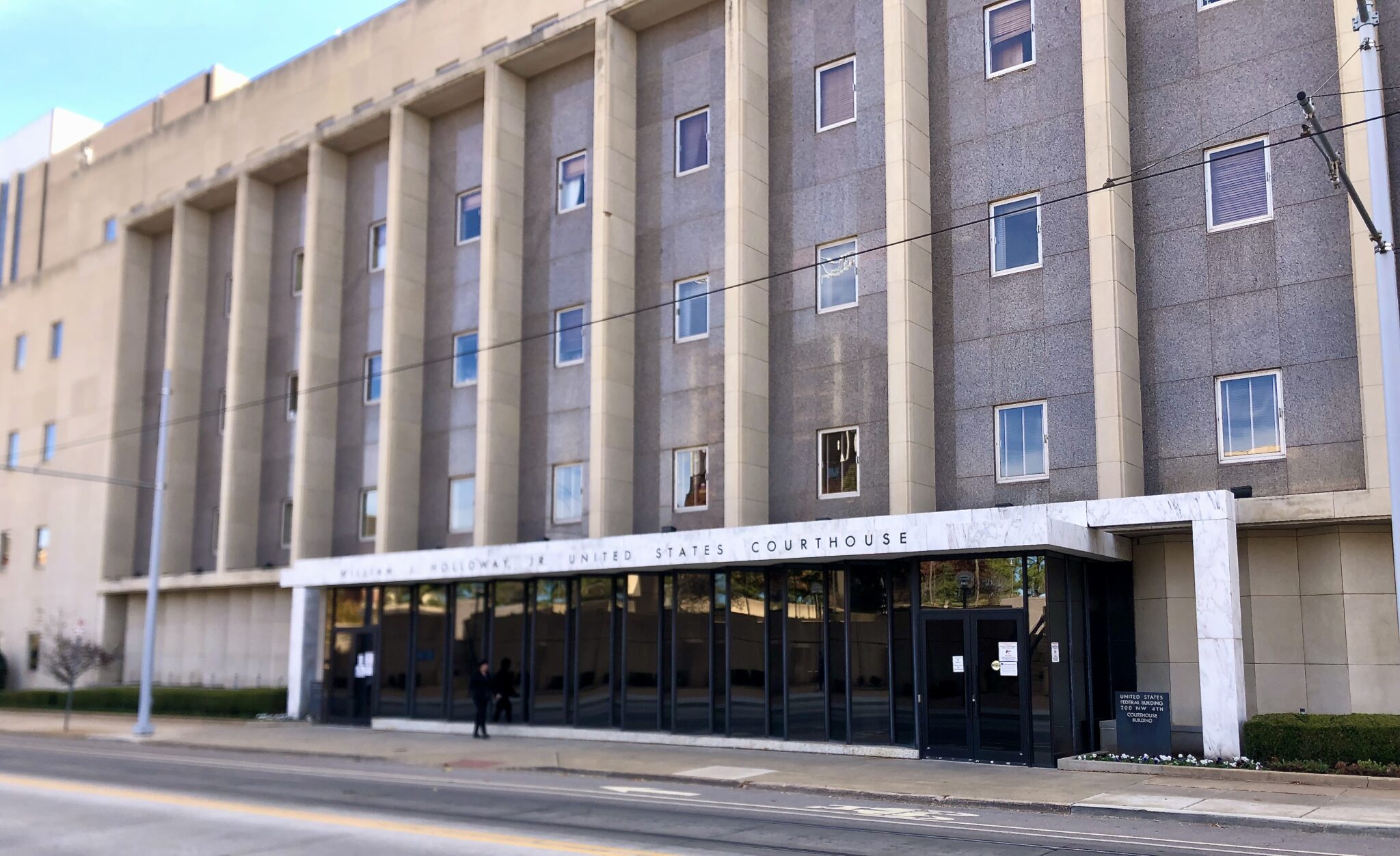
By Nuria Martinez-Keel | OKLAHOMA CITY, Okla. – A lawsuit challenging an Oklahoma law affecting transgender students’ use of school restrooms has been appealed after being dismissed in Oklahoma City federal court.
The families of three transgender students sued the Oklahoma State Department of Education in 2022 to overturn Senate Bill 615, which they said is unconstitutional and a Title IX violation.
SB 615 required school restrooms to be used according to a person’s biological sex, not their gender identity. A single-occupant restroom also must be available as an alternative.
On Friday, the American Civil Liberties Union of Oklahoma appealed U.S. District Judge Jodi W. Dishman’s decision to throw out the lawsuit. Last month, Dishman fully dismissed the case with prejudice, meaning it cannot be refiled.
The dismissal was “mildly surprising” because it means the judge didn’t just disagree, but found the plaintiffs’ claims to be meritless, said Devraat Awasthi, an ACLU legal fellow working on the case.
The ACLU of Oklahoma has appealed Dishman’s decision to the Tenth Circuit Court of Appeals.
“SB 615 is a law that elevates the privacy and safety interest of cisgender students above those of transgender and nonbinary students, and that violates the Constitution’s promise of equality under the law,” Awasthi said. “That’s a promise that all Oklahomans care about, and I think that we are vindicating that important commitment by bringing this appeal.”
Dishman ruled in favor of the state Attorney General’s Office, who contended treatment based on gender identity doesn’t amount to sex discrimination under Title IX.
The three plaintiffs don’t present a danger to fellow students, the judge wrote in her court order, but she decided striking down the law could create a safety issue.
“If the Court adopted Plaintiffs’ position, any biological male could claim to be transgender and then be allowed to use the same restroom or changing area as girls,” Dishman wrote. “This is a major safety concern.
“However, if Plaintiffs’ arguments were adopted, it would put school officials in the position of either having to conduct a subjective analysis of the sincerity of an individual’s gender identity or merely take their word for it.”
The Attorney General’s Office declined to comment on the case.

One of the defendants was state Superintendent Ryan Walters, the head of the state Education Department. He has been one of the most vocal advocates of outlawing school bathroom use by gender identity, saying it puts female students at risk.
“The (U.S.) District Court was correct in recognizing the real physiological differences between men and women, and the real interest of parents in protecting their kids,” Walters said in a statement. “Oklahomans strongly oppose the radical left trying to force young girls to share bathrooms with boys, and I will always fight to protect our students.”
Walters also has been a supporter of Oklahoma laws that prohibit gender-affirming medical care for minors and that block transgender girls from playing in women’s sports. He pursued new rules at the Education Department to prevent students from retroactively changing prior school records to match their gender identity.
Laws like these embolden bullies and put transgender students at risk, Awasthi said.
He pointed to the death of Nex Benedict, a nonbinary student from Owasso who had reported bullying. A medical examiner’s report found Benedict, 16, died by suicide on Feb. 8, a day after the student was in a fight in a school restroom.
“I think an important facet of laws like this in general is it gives cover to bullies and to bigots in our society because it makes them think their kind of discriminatory intent is supported by the state,” Awasthi said. “It kind of gives almost permission for that kind of horrible treatment to occur in our public schools.”
Walters called this argument around Benedict’s death a “grotesquely distorted radical, progressive, Democrat narrative” in a Fox News opinion piece he published on Thursday. Walters’ editorial repeatedly referred to Benedict as a girl, despite the Benedict family having said this is an inaccurate description of who the student was.
About a dozen other states had passed similar bathroom bills by the time Oklahoma’s governor signed SB 615 into law. Legal challenges have succeeded in overturning similar legislation elsewhere in the country.
The U.S. Supreme Court has let stand two rulings from the Fourth Circuit Court of Appeals that affirmed students’ rights to use the restroom that matches their gender identity.
New rules the U.S. Department of Education introduced on Friday include gender identity protections in Title IX.
A co-author of SB 615, Rep. Kevin West, R-Moore, said several Oklahoma lawmakers worked on the bill’s language to “give that safety and that security to the kids.” He said the legislation’s authors chose not to borrow bill language from other states.
“I think that might have helped some in it being able to stand up (in court) because we had so many different eyes on it and so many people working on it,” West said.
******************************************************************************************

Nuria Martinez-Keel covers education for Oklahoma Voice. She worked in newspapers for six years, more than four of which she spent at The Oklahoman covering education and courts. Nuria is an Oklahoma State University graduate.
******************************************************************************************
The preceding article was previously published by the Oklahoma Voice and is republished with permission.
Oklahoma Voice provides independent, nonpartisan reporting that holds officials accountable and elevates the voices of those too often sidelined by the political process.
We’re part of States Newsroom, the nation’s largest state-focused nonprofit news organization.
-

 Arkansas4 days ago
Arkansas4 days agoAnother wound that will never heal; another tragic teen’s death
-

 Political commentary & analysis3 days ago
Political commentary & analysis3 days agoAnti-trans British pediatrician backpedals on her review on HRT
-

 West Hollywood4 days ago
West Hollywood4 days agoBouncer at Heart WeHo arrested in brutal beating of gay stylist
-

 Celebrity News2 days ago
Celebrity News2 days agoJodie Foster honored at TCL’s Chinese Theatre handprint event
-

 Texas1 day ago
Texas1 day agoTexas Governor Abbott: “We Want To End” trans teachers
-

 Editor's Letter2 days ago
Editor's Letter2 days agoRemembering Columbine 25 years later, a reporter’s tale
-

 Riverside County3 days ago
Riverside County3 days agoMurrieta Valley School Board votes to defy state over trans policy
-

 West Hollywood4 days ago
West Hollywood4 days agoCity of West Hollywood is hosting a Public Safety Open House
-

 Books2 days ago
Books2 days agoRob Anderson knows you think he’s annoying
-

 Pennsylvania4 days ago
Pennsylvania4 days agoMoms for Liberty member, others block Maulik Pancholy’s speech
















